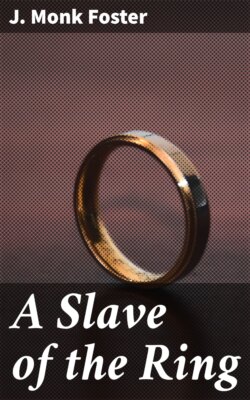Читать книгу A Slave of the Ring - J. Monk Foster - Страница 8
На сайте Литреса книга снята с продажи.
CHAPTER VI.—THE MEMBER FOR ASHLYNTON.
ОглавлениеTable of Contents
Mr. Jonathan Myrelands, the honourable member for the borough of Ashlynton, was at the time the explosion of the White Crow mine occurred a man of sufficient wealth and importance to maintain no fewer than three separate establishments. Being a member of Parliament he had a residence 'in town,' as an opulent mine-owner he had rented a shooting box and some thousands of acres in Scotland, and as the source of his wealth lay in Ashlynton, and he had occasion to visit the town frequently, he still kept up his old house there.
About the time the inquest on the immolated miners was opening, Mr. Myrelands quitted London, so that long ere he reached the neighbourhood of the disaster the inquiry into the lamentable affair was concluded.
As Mr. Myrelands alighted at Ashlynton station, and, in the street outside, was engaging a hansom to drive him home, he heard the newslads bawling out:
'Speshul 'dition, White Crow explosion. Result of the 'nquest!'
He bought a paper and jumped into the vehicle, telling the cabby to drive him to the General Post Office. Here he alighted, despatched a telegram, and that accomplished he rode home in peace, a single glance at the news-sheet having set his mind at rest.
Half an hour later Mr. Myrelands was in his own snug den at Ashlynton House, which stood in one of the finest residential quarters of the borough, awaiting the appearance of the two men for whom he had wired.
The night had fallen some time ago; the blinds were drawn, a big fire was glowing in the low grate, and the gas was burning brightly. There was an ample assortment of wines, spirits, and liqueurs on the sideboard, and a box of the excellent cigars 'Our Member' affected in his more generous moments lay on the table at his elbow.
Myrelands was a big, heavily-fleshed man of five and fifty, not bad looking, if he had been less vain, more able, and a trifle less pompous in his speech and demeanour. He was a self-made man, and was just a little too proud of his own architectural efforts.
In his youth and early manhood he had felt the pinch of poverty not infrequently, but by dint of struggling, scheming, and restless, unsleeping attempts to better himself, he had contrived not only to make money but keep it.
Shortly before the Franco-German war he and another commercial soldier of fortune had contrived to get possession of a small colliery, near Ashlynton; and in their hands the little place prospered.
The partners had managed the colliery themselves; never spending a penny they could save either by scheming or dodging, paring wages and stooping to all kinds of petty knavery in order to further their own aggrandisement.
And when the flood-tide of prosperity set in they were ready to take advantage of the golden stream. Between the years 1870 and 1875 the coal trade flourished to an extent unprecedented in this country. In mining circles that period is known still as the 'Golden Age' of mining, for then hewers of coal could play at pitch and toss for sovereigns, and their masters were amassing fortunes as rapidly as if they had discovered goldfields.
But the little vices that had distinguished Jonathan Myrelands in his days of stress and struggle, clung to him afterwards when his fortune was secured, as the reader will have gathered from what has been already written. He was rich now, and could afford to be generous, but he still had his old objection to burying money in the earth could it be avoided.
Sitting there with a glass of wine at his hand, and a fragrant weed between his lips, Myrelands turned once more to the copy of that evening's Ashlynton Press, which he had purchased near the station.
The sheet was folded down each side, and the heavy headlines, and heavily-leaded lines, were sufficiently attractive to have caught even the eye of an incurious reader. With complacent unction he read the lengthy paragraph aloud to himself. It ran:—
